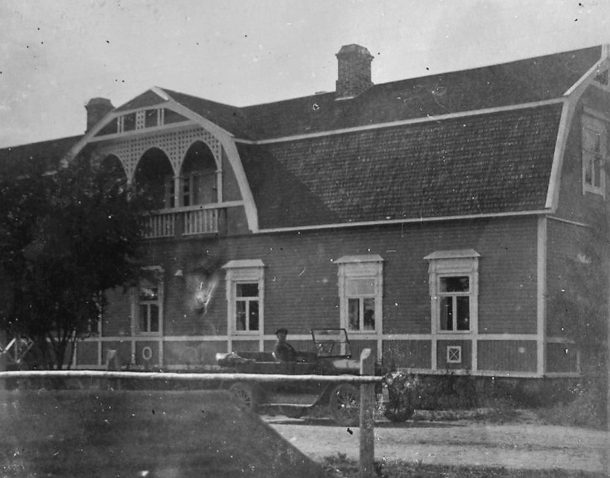Oskar Pärnänen from Juva became a shopkeeper in Sulkava in 1910 and built his shop on an empty lot along Alanteentie road. Three years later, however, the store went bankrupt, like many other stores at that time.
A new shopkeeper
Farmer Matti Vihavainen bought the store that had gone bankrupt and started working as a shopkeeper with his three sons. The store was very successful, being Sulkava’s most profitable store in 1915-1917.
After Matti’s death, his youngest son, Wiljami, inherited the business, which he started running with his wife Taina. In the same year, he raised the one- story building to a handsome two-story, mansard- roofed commercial mansion. The support pillars of the second-floor balcony, designed in the shape of a sugar-loaf are a detail indicating to trading activities.
The mansard-roofed shop building quickly created a new building style for the waterfront, and a few years after the expansion of the Vihavainen’s shop building, both neighbors got a new look for their shops.

Wiljam Vihavainen’s general store
There was a hitching post outside the store, where the men could tie their horses while they were in the store. There was a large sign on the outside wall that said: “Wiljam Vihavainen’s general store“. In accordance with the era, the shop was small, consisting of only one room.
The general store’s selection was diverse. For example, shoes, eyeglasses, oil lamps, fabrics, flour, green coffee, sugar, and various goods for horsemen and cattle breeders were sold there. Children were especially interested in rare treats such as candies wrapped in paper cones and pink gingerbread cookies. Sometimes the shopkeeper could throw in some candy for good measure to take home to the kids. The children also liked the wrapping paper intended for packaging loose goods – it could be used as drawing paper at home.
The purchases were added up with a pen on a piece of paper, and the total was entered into the cash register. The customer received a receipt for his purchases, which was good to keep, because the shopkeeper was a true pioneer in rewarding customer loyalty. Based on the cash receipts kept for purchases made during the year, the shopkeeper gave purchase credit to his customers.
Sulkava’s court sessions
In the chamber next to the shop, there was a bed for customers arriving from different corners of the municipality. Because of the long distances, the shopping trip could take several days.
Sulkava’s court sessions were also held in the shop manor. The judge spent the night in the chamber downstairs, and the prisoners sat in chains in the main room, from where they were brought to the courtroom for the duration of the trial.